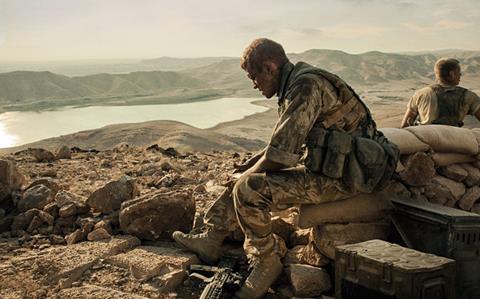Dir: Paul Katis. UK. 2014. 108mins

Set up almost as a classic British war film and featuring a cast of unknown actors, Kajaki: The True Story (released in the US as Kilo Two Bravo) is set in Afghanistan’s Helmand Province in 2006 when a group of soldiers became trapped in a minefield. At times authentically terrifying, and, at others, overly graphic, Kajaki appears on British screens in the midst of a strong wave of public sentiment for the country’s armed forces on the centenary of the outbreak of the First World War.
Katis makes the most of his budget; locations are impressive and the lack of a surging score demonstrates a confidence in the shock and awe of the story of the real-life heroes who inspired this film.
Kajaki is a grueling watch for a civilian, though, and an ordeal for current or former serviceman to relive such agonies. It is an effective reminder of the youth, determination and heroism of the armed forces; a grisly modern-day coda to the upcoming Testament Of Youth. International prospects would seem modest for this all-male affair - while initially Kajaki has the tense air of a thriller, the external threat fails to materialise and it becomes a personal story of survival, very British in tone.
First-time director Paul Katis, working with screenwriter Tom Williams (Chalet Girl), sets Kajaki up in the blistering location heat (Jordan subbed for Afghanistan) with an air of pared-down authenticity as the soldiers of 3 Para patrol the strategic Kajaki Dam. Danger constantly surrounds these ordinary servicemen: from the elements, the restless, unpredictable Afghanis, and, ultimately, the acres of minefields abandoned by the Russians in their retreat.
Kajaki: The True Story is a stumbling tale of heroism under duress, updating classic war stories like The Dam Busters with the modern-day reality of multiple amputations and subsequent survival – where the enemy could spring from a road block, a suicide bomber, “friendly fire”, or the routine patrol of a ravine where mines have been discarded from another bloody war.
Katis finds his strength in depicting the uneasy calm of routine life and sweltering boredom for the British Army’s 3rd Battalion, The Parachute Regiment (3 Para) at the Kajaki Dam. His strength can also his weakness, however: opting for a cast of untried young actors using regional accents, Katis ends up with segments of unclear, slightly rambling dialogue and some perplexing line-readings. As the beleaguered medic, the more experienced Mark Stanley (Game Of Thrones) is a standout, backed by David Elliot as 3 Para’s charismatic leader.
The film eventually gathers strength when a routine patrol sets out on a recon and stumbles into an un-marked minefield, left behind by the Russians in the 1980s. The tension ratchets as the film becomes more and more graphic – with stark scenes of amputations, singed flesh, and screaming panic as the soldiers find themselves trapped in the valley with nowhere to turn.
Katis makes the most of his budget; locations are impressive and the lack of a surging score demonstrates a confidence in the shock and awe of the story of the real-life heroes who inspired this film.
Production company: Pukka Films
International sales: Metro International, www.metro-films.com
Producers: Paul Katis, Andrew de Lotbinière
Executive producers: Gareth Ellis-Unwin, Alexa Jago, Alec Mackenzie, Norman Merry, Phil Hunt, Lee Vandermolen
Screenplay: Tom Williams
Cinematography: Chris Goodger
Editor: Brin
Production designer: Eric Rehl
Main cast: David Elliot, Mark Stanley, Scott Kyle, Benjamin O’Mahony, Bryan Perry





















